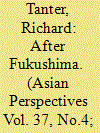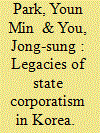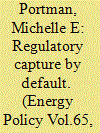| Srl | Item |
| 1 |
ID:
124591


|
|
|
|
|
| Publication |
2013.
|
| Summary/Abstract |
Investigations of the Fukushima nuclear power accident sequence revealed the man-made character of the catastrophe and its roots in regulatory capture effected by a network of corruption, collusion, and nepotism. A review of corruption incidents in the global nuclear industry during 2012-2013 reveals that the Japanese experience is not isolated. Gross corruption is evident in nuclear technology exporting countries such as Russia, China, and the United States, and in a number of nuclear technology importing countries. The survey results make clear that national nuclear regulatory regimes are inadequate and that the global regime is virtually completely ineffective. Widespread corruption of the nuclear industry has profound social and political consequences resulting from the corrosion of public trust in companies, governments, and energy systems themselves.
|
|
|
|
|
|
|
|
|
|
|
|
|
|
|
|
| 2 |
ID:
105778


|
|
|
|
|
| Publication |
2011.
|
| Summary/Abstract |
There is a growing trend to introduce energy efficiency standards at the state level. We examine why electricity utilities may be in favor of such a standard and conclude that energy efficiency standards may be a form of regulatory capture.
|
|
|
|
|
|
|
|
|
|
|
|
|
|
|
|
| 3 |
ID:
159182


|
|
|
|
|
| Summary/Abstract |
Regarding the causes of the Sewol ferry accident that claimed 304 lives in April 2014, some scholars have blamed neoliberal reforms such as deregulation and privatization for the safety regulatory failure. Others have highlighted the role of industry influence and corruption. Our analysis shows that regulatory capture was the crucial causal factor; moreover, this capture was institutionalized from the state-corporatist arrangements of the authoritarian period rather than reflecting new arrangements under the democratic era or corruption per se. The delegation of the critical safety regulation enforcement to the shipping industry association was not introduced as a neoliberal reform but in the context of state corporatism of the Park Chung-hee regime. Democratic governments continued to protect the monopoly of the lucrative Incheon–Jeju ferry business, contrary to neoliberal logic. The legacies of state corporatism persist despite post-financial crisis reform.
|
|
|
|
|
|
|
|
|
|
|
|
|
|
|
|
| 4 |
ID:
127164


|
|
|
|
|
| Publication |
2014.
|
| Summary/Abstract |
This article examines a form of regulatory capture that occurs when significant ambiguity exists regarding the environmental protection standards for new types of activities in the marine environment. To begin with, there is little research that categorizes the typologies of regulatory capture despite the ubiquity of the phenomenon. After a discussion of theoretical approaches to regulatory capture, I describe the operative definition and theory appropriate to the situation related to authorization of oil and natural gas production in Israel following the discovery of large offshore reserves in 2010. This approach, embodying several facets of existing typologies, is applied to decisions made authorizing construction of the Gabriella offshore exploratory drilling platform. The analysis highlights the nature of capture in the absence of clear agency jurisdiction over new activities located in offshore environs organized as temporal and spatial "vacuums". I conclude that comprehensive marine spatial planning would result in less capture and the development of more capture-resistant regulations.
|
|
|
|
|
|
|
|
|
|
|
|
|
|
|
|